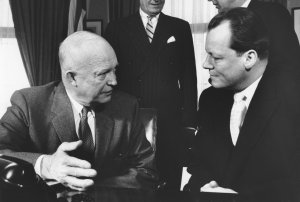Announcer: Many sounds made news in 1959.
Announcer: You can't make out the words, but the meaning is clear: it's unfriendly.
Announcer: Anticommunists picketing Anastas Mikoyan, first of the high Russian emissaries who helped pave the way for the eventual exchange of visits between Premier Khrushchev and President Eisenhower. Mikoyan, with the unusual talents of a trained diplomat, ignored the demonstrators until a UPI reporter in Chicago asked about them.
Anastas Mikoyan: "(Russian.)"
Interpreter: "I must say that as -- as I was coming here, I expected the reception to be good; but what I have seen now is that it is even better than I expected."
Newsman: "How about the demonstrations, sir?"
Anastas Mikoyan: "(Russian.)"
Interpreter: "I attach no importance whatsoever to them. It looks more like a ridiculous comedy than a demonstration. And those, those handfuls do not represent the American people."
Announcer: The Government appealed for courtesy to its guests, reminding the people it would expect similar courtesy from the Russians when Vice-President Nixon made his visit to Moscow.
But before he opened the American Fair in Moscow, Nixon shared first-night honors with Deputy Premier Koslov at the Russian Fair in New York.
Deputy Premier Koslov: "(Russian.)"
Announcer: Koslov introduced the theme of peaceful competition.
Interpreter: "May competition in producing means of destruction be replaced by competition in producing material benefits and accumulating experiential values."
Announcer: Now, Nixon...
Vice-President Richard Nixon: "There is no magic formula which will settle the differences between us, no conference at the Summit which will dramatically end world tensions. The road to peace is a long and a hard one, and if we are to stay on it, both our people and our leaders must display patience and understanding to a maximum degree."
Announcer: Then Nixon went to Moscow.
There, in an unscheduled rough-and-tumble debate before live TV cameras, he tangled with Premier Nikita Khrushchev. This is part of that unusual recording.
Vice-President Richard Nixon: "There are some instances where you may be ahead of us; for example, in the development of your -- of the thrust of your rockets for the investigation of outer space. There may be some instances, for example, color television where we're ahead of you. But in order for both of us... "
Unknown speaker: "(Russian.)"
Vice-President Richard Nixon: "for both of us to benefit"
Unknown speaker: "(Russian.)"
Vice-President Richard Nixon: "for both of us to benefit. You see, you never concede anything."
Unknown speaker: "(Russian.)"
Vice-President Richard Nixon: "Wait'll, wait'll you see the pictures."
Unknown speaker: "(Russian.)"
Announcer: Nixon apparently won a personal triumph in Russia; but the United States gained from a people-to-people contact. Russian-speaking Americans, hired to demonstrate and explain the various exhibits at the Fair, found themselves answering questions on history, politics, life in America.
Gil Alcare worked at the auto exhibit; but he spent most of his time explaining America instead of American cars. His voice is in Russian; another American translates.
Gil Alcare: "(Russian.)"
Interpreter: "Please, I am just an ordinary teacher of the Russian language, and these questions, I can just express my own personal opinion, which may... which is not necessarily... may not be necessarily the opinion of my Government or of our entire population.
"Wants to know of which party I am a member. I am a member of the Republican Party. Perhaps this is because my father also was a member of the Republican Party."
"But in general, I am in agreement with the principles of the Republican Party; but, of course... not all their principles."
"I'm also not in accord with all the principles of the Democratic Party. In our country, you can vote freely as you see fit, regardless of the Party to which you belong."
Announcer: Before returning home, Nixon racked up another first: made a radio-television broadcast to the Russian people. Here's how he sounded in a Moscow living room.
Richard M. Nixon: "Now, some may ask why we don't get rid of the bases, since the Soviet Government declares today that it has only peaceful intentions."
Interpreter: "(Russian.)"
Richard M. Nixon: "The answer is that whenever the fear and suspicions that caused us and our Allies to take measures for collective self-defense are removed, the reason for our maintaining bases will be removed. In other words, the only possible solution of this problem lies in mutual, rather than unilateral action leading toward disarmament."
Announcer: Peace. Mikoyan and Koslov brought that message to the United States; Nixon went to Moscow to show we were receptive; and then Premier Khrushchev himself flew to America.











